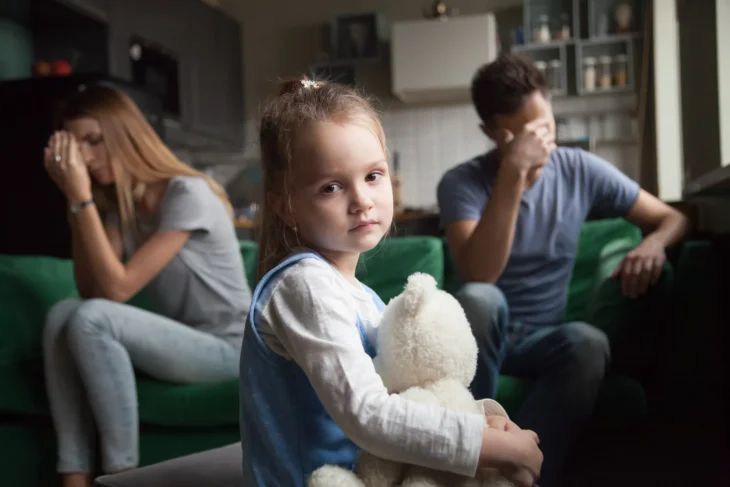When you get divorced and you have children, it is very common for the relationship with your kids to change. Spending less time together and living in separate homes can cause you to drift apart if you do not put in extra efforts to stay connected.
If you are in the position of spending less time with your children following a divorce, these are some of the ways that you can stay connected:

Source: usatoday.com
Contents
- 1. Do a hobby together
- 2. Be persistent with your efforts
- 3. Make them feel at home in your home
- 4. Don’t introduce new partners early on
- 5. Keep a routine
- 6. Have a consistent parenting plan
- 7. Don’t criticise your ex
- 8. Keep communicating when you are not with them
- 9. Have open conversations with your children
- 10. Be the best version of yourself
- 11. Create new traditions and memories
1. Do a hobby together
When you are spending a limited amount of time with your children, it is really important that you put the time to good use and spend quality time together. If you do not already have a shared interest or hobby, you should try finding one that you can enjoy doing together, something that bonds you.
2. Be persistent with your efforts
After their parents divorce, children often go through a very confusing period and they might feel that one parent is at fault for the divorce and might be protective of the other one. They may also be hearing negative things about you from your ex-spouse, so it is important to not let this dictate your future relationship. If you keep putting in the effort to see your child and show how much you love them, they should be in a better position to re-build the relationship with you once they get through the confusing period.

Source: thefirmformen.com
3. Make them feel at home in your home
If you move into a new property, try and get your children as involved as possible, letting them choose furniture and set up their own room if possible. Let your child choose how their room is decorated and find other ways to get their input so they feel at home when they come to visit.
Putting up photographs of you with your children around the house will also help them to feel more at home and also act as a visual reminder that they are your number one priority.
4. Don’t introduce new partners early on
If you meet a new partner, don’t rush into introducing your children to them. Even if you are confident that the relationship is going to last and that your children will like your new partner, your children might feel threatened by your new relationship. If you do decide to introduce a new partner to your children, make sure that you still spend plenty of time with your children when your partner is not there.

Source: medium.com
5. Keep a routine
Wherever possible, try to keep your routine with your children as consistent as you can, so that they know when they are seeing you and do not cancel plans if you can avoid it. Your children need as much stability in their life as possible following their parents’ divorce when they are experiencing lots of changes. If you arrange to see your children on random days, without any pattern, this takes some stability away from them.
6. Have a consistent parenting plan
Try to keep the rules and routine at each parent’s house as consistent as possible, such as rules around bedtimes, screen time, curfews and any other rules your children have grown up with. If children have different sets of rules with each parent, it can be confusing and can lead to arguments and sometimes it can be the source of behavioural issues. As parents, you should be working together to set rules that are in place for your child’s welfare, even if you are living in separate homes.
Children will sometimes try to convince one parent that the other lets them go to bed later or gives them more pocket money, or lets them choose their own meals etc. to see what they can get away with. Even if you are not on good terms with your ex, you should try to communicate regularly about decisions around your children’s routine.

Source: allprodad.com
7. Don’t criticise your ex
If the divorce has ended acrimoniously, it can be difficult to stay on good terms with your ex but saying negative things about them to your children will make the situation a lot harder for them to deal with. When you are with your children, try to avoid talking about your ex if you are worried that you might say something negative. Your children need to know that they are loved by both of you and they do not need to know details that could potentially hurt them or confuse them even further.
If your ex is making it difficult for you to see your children then this can be very frustrating but do not react in front of your children. Instead, you should try using a professional mediator or even a family member who can help you to meet in the middle. If you are still struggling to come to an agreement regarding arrangements for seeing your children, you should seek the advice of an experienced family divorce solicitor such as Brookman.
There are also child contact centres that can be used to help with arranging meetings with your children without having to see your ex, if you don’t want to see them.
8. Keep communicating when you are not with them
If your children are old enough to have their own phones then you should be able to easily communicate with them without going through your ex. If this is the case, make sure that you let them know you are thinking about them and that you are looking forward to the next time you get to spend time with them. A daily phone call will help to stay in touch with what is happening in their life on a daily basis and you won’t miss out on significant news.
If your children are too young to have their own phone, try to arrange with your ex to talk to them or video call them at a time that is convenient.

Source: roadtogrowthcounseling.com
9. Have open conversations with your children
After your divorce, you should try to keep having open conversations with your children, so that they can ask you questions and you can help them to understand certain details. You should be as honest as possible without providing details that could cause them any unnecessary worries. You should try to form a relationship where your children feel comfortable asking you questions, and they should also be comfortable with you asking them questions about their life.
10. Be the best version of yourself
Many fathers can find divorce emotionally challenging and they start to change their lifestyle, or they might feel angry about the divorce. Remember that you are setting an example for your children, even if they are not living with you and you should try to be the best role model possible.
If you are feeling angry or depressed about the divorce, try to work through your emotions by talking to friends and family and making good lifestyle choices. Many men experience a decline in health after a divorce due to lifestyle changes and the emotional stress of a divorce, so making the right choices will help you to keep the bond with your children stronger. You will be able to spend more quality time with your children if you are in the right frame of mind.
If you are struggling with your mental health, get support through friends, family or professional support such as speaking to your doctor. If you can be happier, this will hugely benefit your children and your relationship with them.

Source: baltimoretherapycenter.com
11. Create new traditions and memories
Try to see your life after the divorce as a new chapter where you can build up lots of amazing new memories with your children. You can plan adventures and start up new traditions such as having a movie night when they come to stay. Make sure you start taking photos of your experiences and get them printed off to put around your house to remind you of your best recent memories together.
With so many changes happening through the process of a divorce, it is impossible to avoid some changes to the relationship that you have with your children. The important factor is that you are able to build a strong relationship going forward, even in the different circumstances.
If you suffer any setbacks such as your children not wanting to meet up, try to think about the bigger picture and that it doesn’t necessarily reflect their feelings towards you. As they get older, they will understand more and as long as you have consistently shown them that you love them and want to be in their life, you should be able to have a strong relationship as they get older and become adults.
You might have to overcome lots of hurdles and difficult times but if you follow these 11 tips for staying connected with your children, you will have a much better chance of keeping a strong bond.
